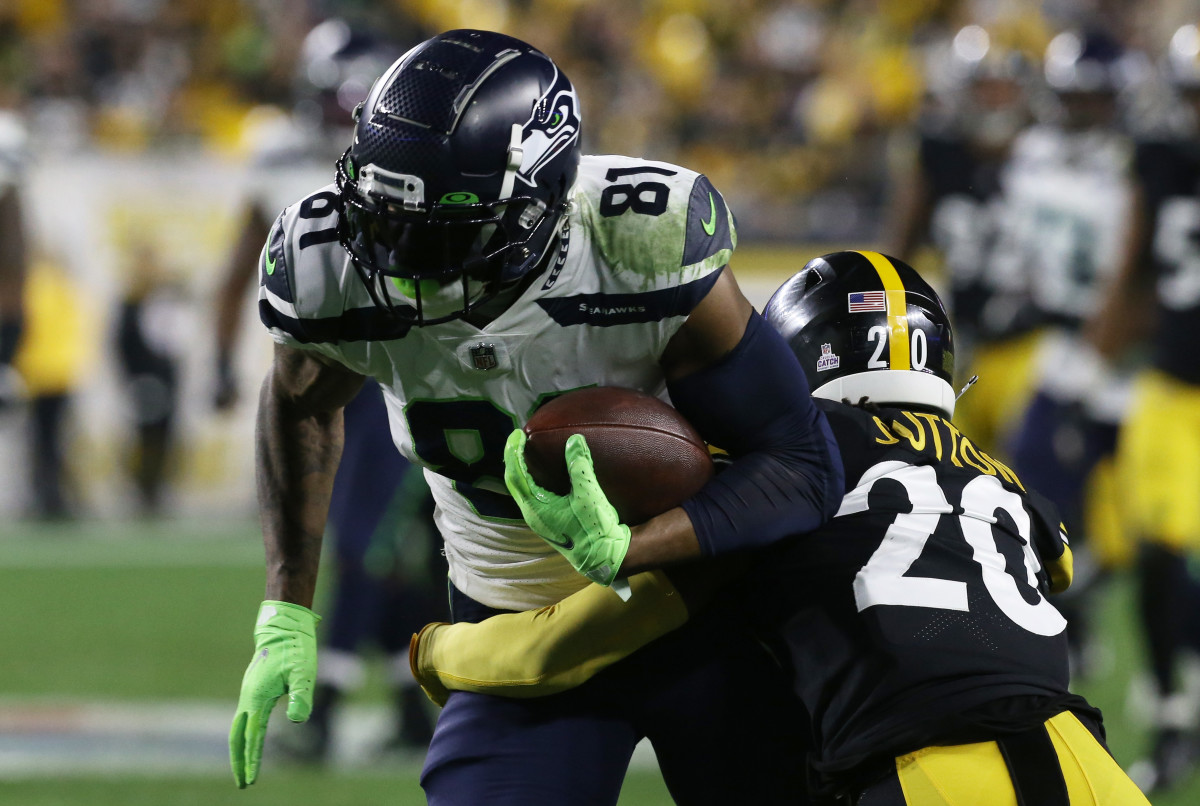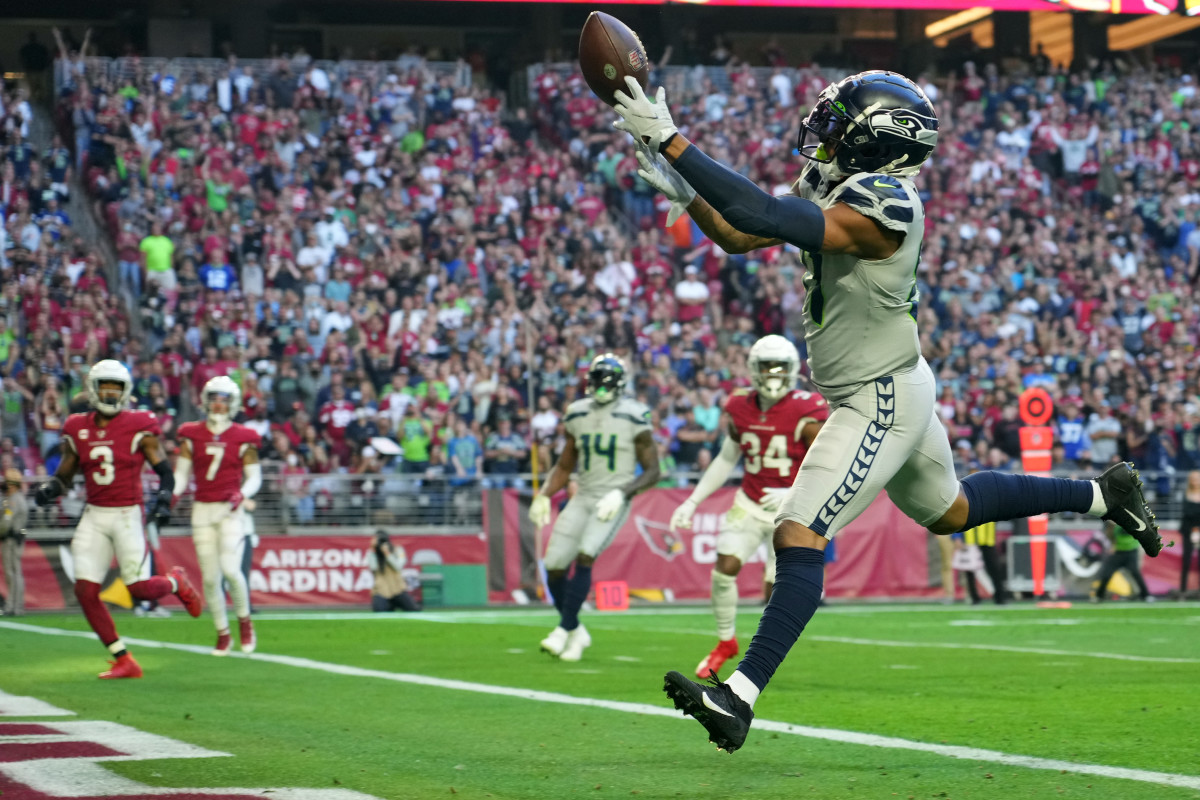Did Gerald Everett Play Well Enough to Justify Second Contract With Seahawks?
Bolting from one NFC West rival to another during free agency to sign with the Seahawks, Gerald Everett entered the 2021 season with high expectations joining one of the NFL's most prolific offenses in the Pacific Northwest.
Finding himself in the ideal situation on all fronts, Everett would reunite with Shane Waldron, his former tight end coach and passing game coordinator in Los Angeles who had been tabbed by Pete Carroll to replace Brian Schottenheimer as Seattle's new offensive coordinator. Playing in a familiar offense, he also would benefit from an upgrade at quarterback catching passes from Russell Wilson, who had thrown a career-best 40 touchdown passes in 2020.
Unfortunately, Everett's first season with the organization didn't unfold quite as planned. Though he did record career-highs with 48 receptions, 478 receiving yards, and four touchdowns, due to factors both in and out of his control, the former South Alabama standout didn't emerge as the complementary weapon alongside Tyler Lockett and DK Metcalf that the Seahawks envisioned he would be when they signed him to a one-year deal in March.
In some regards, the Seahawks did get what they paid for. After several seasons finishing in the bottom half of the league in yards after the catch, per Per Pro Football Focus, Everett finished a respectable ninth among tight ends with 50 or more targets averaging 5.2 yards after the catch per reception. He was credited with 11 missed tackles forced, tied for sixth-most among players at his respective position, bringing toughness and physicality their passing game lacked in the past.

Everett also provided an element of explosiveness that had been missing at tight end for Seattle, producing seven receptions of 16 or more yards on the season. Combining his ability to stretch the field with his after-catch tenacity, his longest play came on a 41-yard reception against the Steelers where he bulldozed through three tackles before finally being brought down a few yards short of the goal line.
To his credit, Everett also gave the Seahawks a quality effort as a blocker despite his lack of size compared to most tight ends. He received a respectable 63.5 blocking grade from Pro Football Focus, including scoring well in pass protection (76.8) on 35 pass blocking snaps.
Gerald Everett bowls over the Steelers defense to set up a Will Dissly touchdown catch and the Seahawks suddenly find themselves down by only a field goal at 17-14. #GamblingTwitter #SportsBetting #SEAvsPIT #SundayNightFootballpic.twitter.com/b2kWJg6Bdt
— BestOdds.com (@BestOddsBets) October 18, 2021
While his ability to create with the football in his hands and occasionally contribute as a vertical threat helped Seattle, however, Everett struggled from a consistency standpoint. In five of the 15 games he played in, he finished with 15 or less receiving yards. He also had six games with two or fewer receptions, far too often becoming an afterthought in the passing game.
Some of this, of course, had to do with Wilson suffering the first significant injury of his career in Week 5. The star quarterback sat out three games after undergoing surgery on his right middle finger and with him sidelined, Everett was targeted a grand total of eight times by backup quarterback Geno Smith, catching six of those passes for 58 yards. Taking his long reception against the Steelers out of the equation, he caught five passes for just 17 yards and was a relative non-factor.
Once Wilson returned, Everett did see a substantial uptick in targets, emerging as a bright spot while the rest of the Seahawks offense struggled. He caught all eight passes thrown his direction for a team-best 63 yards in a 17-0 loss to the Packers in Week 10 and during a four-week stretch, he reeled in 20 out of 27 targets for 144 yards and a touchdown.
But over the final six weeks of play, concentration drops and ball security woes plagued Everett. He endured one of the worst games of his career in Week 13 against the 49ers, losing a fumble on a shovel pass near the goal line, losing another fumble that led to a touchdown catch by tight end George Kittle on the very next play, and dropping a would-be touchdown in the end zone that ended up being intercepted by cornerback K'Waun Williams. Luckily, the Seahawks were able to hold on for a 30-23 win in spite of his litany of mistakes in crucial moments.

At the tail end of the season, Everett had a pair of drops in the final two games, including letting a perfectly throw from Wilson slide through his hands in the end zone in the season finale against Arizona. If he would have hauled the pass in, Seattle would have entered halftime up by 11 instead of nursing a 17-10 advantage.
Considering his up and down performance, the Seahawks face an interesting decision on whether or not to bring back Everett in 2022.
On one hand, set to turn 28 years old in June, Everett remains a young player with untapped upside. As the year progressed, Seattle found ways to get him more involved in the aerial attack with him snagging 34 passes for 343 yards and three touchdowns in the final nine games. He finished third on the team in yards after the catch, led the team in missed tackles forced by a receiver or tight end, and finally became a reliable safety blanket for Wilson with 19 first down receptions in the second half.
One would assume after a strong finish that a second season paired with Wilson in Waldron's familiar offense would yield better results and maybe this time, he could fulfill on his promise with the breakout year everyone has been waiting anxiously for.
To the contrary, however, Everett's array of physical gifts and glimpses of star potential have never produced more than 500 receiving yards or five touchdowns in a season, which partially explains why the Rams were willing to let the former second-round pick walk a year ago. Now five years into his career, it's worth wondering if he will ever develop into a consistent playmaking threat in the passing game and his propensity for drops, fumbles, and untimely mental miscues are alarming.
Ultimately, how the tight end market unfolds could determine whether or not Everett returns to Seattle for another season. A number of other talented players at the position, including Mike Gesicki of the Dolphins, O.J. Howard of the Buccaneers, David Njoku of the Browns, and Mo Alie-Cox of the Colts, are scheduled to become unrestricted free agents.
If the majority of those players don't receive extensions from their respective teams and hit the market, the Seahawks could pursue one of them instead or use them as leverage to bring back Everett at a cheaper price. If most of them remain with their current teams, however, other teams may be willing to pay a bit more for his services considering his athletic tools and flashes of brilliance, leaving his future as uncertain as any of their pending free agents.
